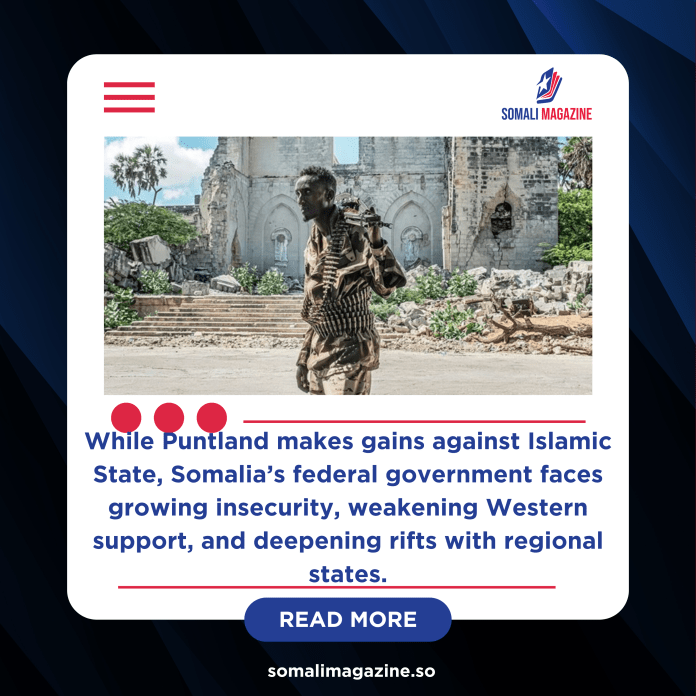Facebook Twitter (X) Instagram Somali Magazine - People's Magazine
The road between Garowe, the capital of Puntland, and Bosaso port runs through dangerous territory controlled by jihadist groups: the Islamic State (IS) in the east and al-Shabab in the west. For the past eight months, Puntland forces—supported by U.S. and UAE airstrikes—have been fighting IS militants. According to Puntland officials, the operation has been very successful, with nearly 800 IS fighters reportedly killed and the rest cornered in a cave complex. Puntland’s President Said Deni hopes to eliminate all terrorists from the region by the end of the year.
This success stands in sharp contrast to the situation in the rest of Somalia. The federal government in Mogadishu appears increasingly weak. Al-Shabab has retaken territories in central Somalia, shelled Mogadishu’s airport, and even bombed the president’s convoy. Some observers now fear that al-Shabab could capture Mogadishu itself.
President Hassan Sheikh Mohamud had early successes when he took office three years ago. He pushed back al-Shabab, gained international support, secured debt relief, and had the UN arms embargo lifted. However, things took a turn in March 2024 when his government amended the constitution. The changes centralized power in the presidency and introduced direct national elections for 2026, replacing Somalia’s traditional clan-based system. Critics argue this undermines federalism, which gives regional states like Puntland and Jubaland control over their own affairs, including taxation and security.
The result has been a major fallout between the central government and federal member states. Puntland cut ties with Mogadishu over a year ago. President Deni has even spoken about strengthening ties with Somaliland, a breakaway region that also opposes central rule. In southern Somalia, relations between Mogadishu and Jubaland are worse. The federal government rejected the re-election of Jubaland’s leader, Ahmed Madobe. Both sides issued arrest warrants against each other, and the federal government blocked flights to Jubaland. Recent fighting between federal and Jubaland forces left at least five people dead.
The Somali government argues that tensions between the center and regions have always existed. However, this time could be worse because international support for Somalia is fading. The African Union’s peacekeeping force, which has helped fight al-Shabab since 2007, is being downsized. A replacement force was supposed to arrive in January 2025, but funding issues have delayed it. The EU may contribute €60 million, but that won’t be enough. The U.S. has cut aid drastically—from $1.2 billion in 2023 to less than $400 million in 2025—with no funding for Somali special forces’ salaries or logistics.
Some in Washington are now questioning whether rebuilding Somalia through Mogadishu is still realistic. There is growing interest in working more closely with regional governments like Somaliland and Puntland, which are seen as more stable. Somaliland, for instance, has asked the U.S. to build a military base on its coast in return for formal recognition. In June, America’s top general for Africa visited Somaliland—a sign of possible shifting priorities.
If this shift continues, Mogadishu could become more vulnerable. The Somali army in central and southern areas is struggling. There have been multiple assassinations of top commanders, which some believe are linked to al-Shabab infiltrating the military. Reports also suggest that al-Shabab is receiving weapons and training from Yemen’s Houthi rebels, raising fears that the group could soon launch a major attack on the capital.
While outside powers like Turkey or Qatar may step in to protect Mogadishu from falling, Somalia’s challenges are growing. With less foreign funding and deepening political divisions, the country risks further instability. There are fears of renewed clan violence and growing influence of foreign-backed armed groups—trends that could unravel decades of fragile progress. As Somalia stands at a crossroads, its future remains uncertain.

